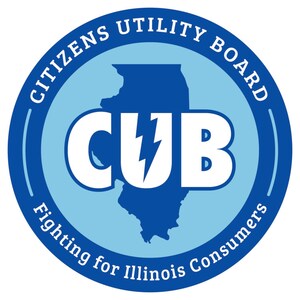
CUB Analysis: IL Clean Jobs Bill Would Save Consumers $1.6 Billion
Expert modeling analysis reveals big gap between Clean Jobs legislation, Exelon bill
CHICAGO, April 16, 2015 /PRNewswire-USNewswire/ -- State legislation to strengthen energy efficiency standards would save Illinois consumers more than $1.6 billion by 2030, sparking average residential savings of nearly $100 a year going forward, according to an expert modeling analysis released by the Citizens Utility Board (CUB) Thursday.
The Illinois Clean Jobs bill (House Bill 2607/Senate Bill 1485) was introduced in February by Sen. Don Harmon and Rep. Elaine Nekritz. It would require Commonwealth Edison and Ameren Illinois to use customer efficiency programs to reduce electricity demand by 20 percent by 2025—a 50 percent improvement over current standards.
"The numbers prove that the Illinois Clean Jobs bill is the only energy legislation in Springfield that would actually spark customer savings," CUB Executive Director David Kolata said. "At a time when customers are being hit hard by volatile power markets and rate-hike happy energy companies, our analysis shows that efficiency is the best way to keep out-of-control electricity bills in check."
CUB created three cost-benefit models for the Illinois Clean Jobs bill, based on electricity rates, past performance of efficiency programs and prudent assumptions about yearly increases in energy usage, key market costs and inflation. The consumer watchdog's analysis compared those models with a "business as usual" scenario—if efficiency standards stayed at current levels. Estimated customer savings through the legislation ranged from about $1.1 billion to $2.2 billion. The "base case" model, based on mid-range assumptions, projected the following statewide benefits by 2030, if the bill were fully implemented:
- Total cumulative residential savings: $1.61 billion
- Average electric-bill reduction: 7.86 percent annually
- Average residential savings: $98.38 a year
The Illinois Clean Jobs bill stands out as the most consumer-friendly among the major energy proposals in the General Assembly's spring session. Most notably, Exelon Corp., ComEd's parent company, is pushing for special legislation that could cost ComEd and Ameren customers an estimated $300 million a year—to boost revenue at its fleet of nuclear power plants.
"Rate-hike legislation pushed by Big Energy lobbyists is a short-sighted reaction to Illinois' energy challenges," Kolata said. "Our analysis shows how the Illinois Clean jobs bill is an investment in the state's energy future. It gives Illinoisans a clear path to cut their electric bills."
Kolata urged Illinois consumers to visit www.CitizensUtilityBoard.org, where they can send messages to their legislators in support of the Illinois Clean Jobs bill.
The mid-range model built by CUB assumed a 2.28 percent inflation rate (2.76 percent for the power sector), based on Energy Information Administration (EIA) projections.
Based on a review of historical and expected prices, CUB also projected a 5 percent growth in electric market "capacity costs" in PJM Interconnection, which is northern Illinois' electricity market. Capacity costs are volatile fees wrapped in electricity prices to ensure that power plants produce enough energy when demand is highest.
Finally, the model assumed a 0.8 percent increase in "load growth," or electricity usage, to 2030—which is a reasonable growth rate based on EIA projections.
Created by the Illinois Legislature, the Citizens Utility Board (CUB) opened its doors in 1984 to represent the interests of residential and small-business utility customers. Since then, the nonprofit utility watchdog group, which is a member of the Illinois Clean Jobs Coalition, has saved consumers more than $20 billion by helping to block rate hikes and secure refunds. Call CUB's Consumer Hotline, 1-800-669-5556, or visit CUB's award-winning website, www.CitizensUtilityBoard.org.
SOURCE Citizens Utility Board






Share this article